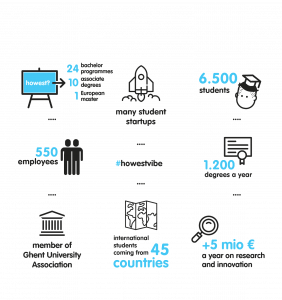Denmark: University College Nordjylland and Vestbjerg Skole
UCN – University College Nordjylland
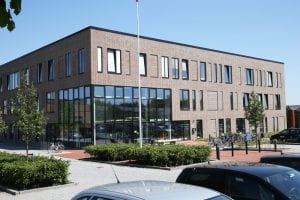 UCN is a university of applied sciences and provides higher education and performs research, development and innovation activities within the four main areas of business, social education, health and technology. UCN has around 8,000 full time students; 9,000 part time students; 800 employees and offers 40 business academy and professional bachelor’s degree programs; eight top-up programs; as well as continuing and further education programs.
UCN is a university of applied sciences and provides higher education and performs research, development and innovation activities within the four main areas of business, social education, health and technology. UCN has around 8,000 full time students; 9,000 part time students; 800 employees and offers 40 business academy and professional bachelor’s degree programs; eight top-up programs; as well as continuing and further education programs.
UCN has international partners all over the world and engages in both research and mobility cooperation. The main part is partner institutions which offer exchange possibilities for students and staff. Currently, the international department at UCN has 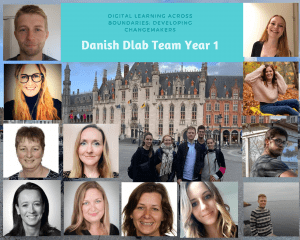 more than 1,400 students from 50 countries. It is UCN’s mission to engage in Real Life Education. Hence, the approach to learning is based on the interaction between theory and practice combined with personal reflections. This approach is referred to as Reflective Practice-based Learning. The main aim is for the students to be able to set up hypotheses and test ideas in practice and through that practice their ability to suggest solutions and argue for certain actions. As for the lecturers, it is a constant demand to acquire knowledge about and insight into practice via contact to the labor market. The Bachelor of Education program is a 4-year bachelor’s degree program. The objective of the Bachelor of Education program is to train teachers for the primary and lower secondary school system (children aged between 5 and 16) and to provide students with a basis for continued professional development. The program combines discipline-specific and pedagogical subjects and during the course of their studies, students do work placements in schools a number of times.
more than 1,400 students from 50 countries. It is UCN’s mission to engage in Real Life Education. Hence, the approach to learning is based on the interaction between theory and practice combined with personal reflections. This approach is referred to as Reflective Practice-based Learning. The main aim is for the students to be able to set up hypotheses and test ideas in practice and through that practice their ability to suggest solutions and argue for certain actions. As for the lecturers, it is a constant demand to acquire knowledge about and insight into practice via contact to the labor market. The Bachelor of Education program is a 4-year bachelor’s degree program. The objective of the Bachelor of Education program is to train teachers for the primary and lower secondary school system (children aged between 5 and 16) and to provide students with a basis for continued professional development. The program combines discipline-specific and pedagogical subjects and during the course of their studies, students do work placements in schools a number of times.
![]() UCN performs research into real-life challenges. The research activities are handled by assistant professors, associate professors, docents and PhD students who are up to date with the challenges and work conditions that companies and organizations in practice are subject to and cover a wide range of competencies.
UCN performs research into real-life challenges. The research activities are handled by assistant professors, associate professors, docents and PhD students who are up to date with the challenges and work conditions that companies and organizations in practice are subject to and cover a wide range of competencies.
Vestbjerg Skole
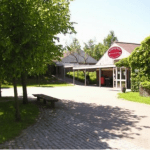 Vestbjerg Skole is a public school situated in the northern part of Denmark, as Vestbjerg is 10 kilometers north of Aalborg. Vestbjerg Skole has 522 students. Vestbjerg Skole takes students from 5-16 years old.
Vestbjerg Skole is a public school situated in the northern part of Denmark, as Vestbjerg is 10 kilometers north of Aalborg. Vestbjerg Skole has 522 students. Vestbjerg Skole takes students from 5-16 years old.
Vestbjerg Skole strives to meet the following goals set by the municipality of Aalborg;
- Everyone can see that they become better every day
- Everyone has the courage to participate in the world around them
- Everyone has a friend at school
- Learning is predominantly experimental and problem-solving
- All staff work systematically with knowledge production
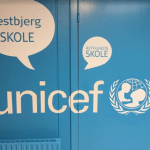 Vestbjerg Skole is a Rights Respecting School certified in 2019 by UNICEF. Becoming a Rights Respecting School was a natural result of our focus on the importance of a safe and respectful learning environment without prejudice. Our students learn about children’s rights and putting them into practice every day. We are promoting values of respect, dignity and non-discrimination and
Vestbjerg Skole is a Rights Respecting School certified in 2019 by UNICEF. Becoming a Rights Respecting School was a natural result of our focus on the importance of a safe and respectful learning environment without prejudice. Our students learn about children’s rights and putting them into practice every day. We are promoting values of respect, dignity and non-discrimination and  strive to build the confidence of our students so they become active and involved in the school life and in a the wider world. We focus on international and cross-cultural awareness and take pride in building the students’ interest in and knowledge about the world, which enables them to make informed decisions and to take an active part in creating the future.
strive to build the confidence of our students so they become active and involved in the school life and in a the wider world. We focus on international and cross-cultural awareness and take pride in building the students’ interest in and knowledge about the world, which enables them to make informed decisions and to take an active part in creating the future.
UK: University of Northampton and Northampton International Academy
University of Northampton
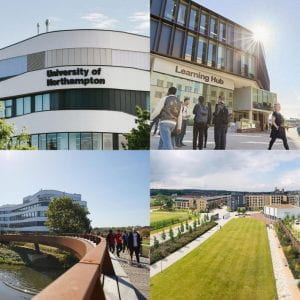 The University of Northampton is located in the south east of England. Around 12,000 students study at UON, as undergraduates or postgraduates in a range of different subjects in one of our three faculties: Faculty of Health, Education and Society; Faculty of Business and Law; and Faculty of Arts, Science and Technology. UON began as a technical college, earning its university status in 2005, making it one of the youngest universities in the UK.
The University of Northampton is located in the south east of England. Around 12,000 students study at UON, as undergraduates or postgraduates in a range of different subjects in one of our three faculties: Faculty of Health, Education and Society; Faculty of Business and Law; and Faculty of Arts, Science and Technology. UON began as a technical college, earning its university status in 2005, making it one of the youngest universities in the UK.
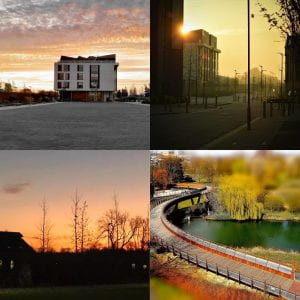 Despite this, UON was the first university to be named as a Changemaker campus in 2012. This is due to the work done to add value to society, and also in ensuring students and graduates have the opportunity to make their mark on the world. UON understands that sharing knowledge, supporting creativity and striving to make a positive difference will change the future; it has obtained awards in this area in keeping with our ethos of ‘transforming lives: inspiring change’.
Despite this, UON was the first university to be named as a Changemaker campus in 2012. This is due to the work done to add value to society, and also in ensuring students and graduates have the opportunity to make their mark on the world. UON understands that sharing knowledge, supporting creativity and striving to make a positive difference will change the future; it has obtained awards in this area in keeping with our ethos of ‘transforming lives: inspiring change’.
 UON works closely with Erasmus+, having over 40 Erasmus agreements with partners throughout Europe collaborating on research as well as providing students with the opportunity for international study. Staff at UON encourage students to take part in projects to gain transferable skills for their future careers, and in order to develop understanding of the benefits of working within the wider community, and the importance of adding value to society.
UON works closely with Erasmus+, having over 40 Erasmus agreements with partners throughout Europe collaborating on research as well as providing students with the opportunity for international study. Staff at UON encourage students to take part in projects to gain transferable skills for their future careers, and in order to develop understanding of the benefits of working within the wider community, and the importance of adding value to society.
More info: https://www.northampton.ac.uk/
Spain: University of Santiago de Compostella and USC-CPI O CRUCE
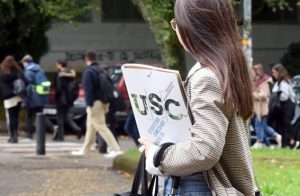
The University of Santiago de Compostela (USC) is a public institution for higher education and research endowed with autonomy, full legal personality and its own heritage, which is made up by the campuses of Santiago de Compostela and Lugo and which assumes and carries out its functions as an essential public service to the community through study, teaching, research and the transfer of knowledge.
The USC is part of the Galician University System (SUG) and, as a public administration, is governed by the principles of legality, effectiveness, efficiency, transparency and quality, and is organised in a democratic manner, ensuring the participation of different sectors of the university community in its governance.
USC in figures
1.840: students in mobility programmes (2018-19)
3,294: teaching, research and administration professionals (2019)
41: teaching centres
184: Undergraduate, Master’s Degrees and PhD Programmes (2018-19)
7.76 and 8: High scores in the assessment of the quality of degrees and master’s degrees (2013-18)
28: Research Institutes and Centres and 299 Research Groups (2019)
25,532: Degree, Master’s Degree, PhD students… (2018-19)
20: library service points and 6,475 reading posts (2019)
1.135: places 3 Residences and 3 Halls of Residence (2018-19)
€64 : million of external resources for research and 228 R&D projects (2020)
50: departments
2,095: articles published, 282 PhD theses (2020)
Norway: Ostfold University College, Ostfold Commune and Spetalen Skole
Spetalen School
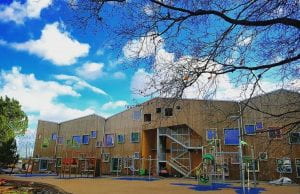 Spetalen school is situated in a little place called Saltnes, by the South East part of the Oslo fjord. Spetalen is a primary school, with around 240 pupils and 35 teachers/assistants. We all work to prevent bullying in school, by creating effective classroom management and by following the same sets of rules and consequences.
Spetalen school is situated in a little place called Saltnes, by the South East part of the Oslo fjord. Spetalen is a primary school, with around 240 pupils and 35 teachers/assistants. We all work to prevent bullying in school, by creating effective classroom management and by following the same sets of rules and consequences.
Every classroom, and a lot of group rooms in our school, are equipped with Digital Boards, and all pupils have their personal iPad for use both in school and at home. All the teachers also have their own laptop and iPad. Our digital platform is Office 365. In December 2017, we moved into a brand new school building, which also was selected “School of the Year” in 2018.
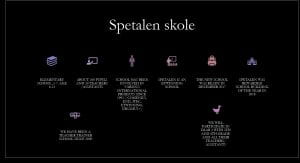 The staff at Spetalen has a lot of experience, working with international projects and ICT –projects. We participated in one of the first Comenius projects in Norway, from 1995-2000. Spetalen was also part of the ENIS-network, The national network of schools working to find innovative ways of using ICT in education, and we have participated in numerous eTwinning projects. Some of them awarded with international prizes. In 2019 we also got the eTwinning School Label. The latest project is DLAB2 , our second Erasmus+ Project.
The staff at Spetalen has a lot of experience, working with international projects and ICT –projects. We participated in one of the first Comenius projects in Norway, from 1995-2000. Spetalen was also part of the ENIS-network, The national network of schools working to find innovative ways of using ICT in education, and we have participated in numerous eTwinning projects. Some of them awarded with international prizes. In 2019 we also got the eTwinning School Label. The latest project is DLAB2 , our second Erasmus+ Project.
Our school also have four educated teacher trainers, and every year one to three groups of teacher students from Østfold University College, come to our school for their internship. This gives our teacher students a unique possibility to try out various digital tools and new exciting ways of teaching.
Belgium: Howest University College and Middenschool Brugge Centrum
Howest University College
Howest University of Applied Sciences is an atypical, creative, innovative and entrepreneurial university college. Anticipating the future, starting from each individual student’s talent and motivation, Howest educates its students to competent, employable and team-oriented professionals.
Howest sets the tone for socially relevant, practice- and valorisation-oriented education, research and services to society, with a wide regional and international outlook. Howest is an open-minded and pluralistic university college, with respect for diversity. Howest inspires its staff and students to integrate its core values in their professional as well as their personal lives.
In the bachelor of primary and secondary education department Howest focuses on various skills and competences such as communication, coaching, ICT, teamwork innovation, out of the box thinking and creativity and a lot of practice in real school environments.
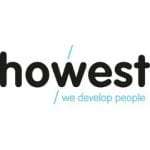 Highlights in our education department are MaM (Mind-and Makerspace), EdHUB (future classroom), the Sports Innovation Campus (campus for physical education with the newest digital tools and teaching methods), Vital Schools (research project about getting students and staff more on the move during teaching hours), and the international opportunities (study and traineeship abroad, cultural and field trips, international projects).
Highlights in our education department are MaM (Mind-and Makerspace), EdHUB (future classroom), the Sports Innovation Campus (campus for physical education with the newest digital tools and teaching methods), Vital Schools (research project about getting students and staff more on the move during teaching hours), and the international opportunities (study and traineeship abroad, cultural and field trips, international projects).
More info: https://www.howest.be/en
Middenschool Brugge Centrum
 Middenschool Brugge Centrum is an autonomous secondary school for students of the first grade of secondary school in the middle of the historic centre of medieval Bruges. Thanks to a continuous professionalization of the team, the stimulation of the involvement of our students and the collaboration with parents and external parties we offer a wide support for the pursuit of quality and pluralistic education within the pedagogical project of the GO! Education of the Flemish Community.
Middenschool Brugge Centrum is an autonomous secondary school for students of the first grade of secondary school in the middle of the historic centre of medieval Bruges. Thanks to a continuous professionalization of the team, the stimulation of the involvement of our students and the collaboration with parents and external parties we offer a wide support for the pursuit of quality and pluralistic education within the pedagogical project of the GO! Education of the Flemish Community.
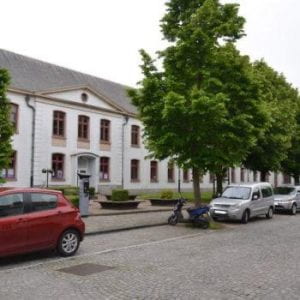 On average we count about 180 students divided in five classes in the first year and five classes in the second year. The school works according to the principle of basiX, eXtend, eXplore and eXplain. This means we offer a broad basis education, but in addition the pupils get the opportunity to deepen or to remedy their skills. Beside they also get the chance to taste from different subjects in order to make a good study choice in second degree of secondary school.
On average we count about 180 students divided in five classes in the first year and five classes in the second year. The school works according to the principle of basiX, eXtend, eXplore and eXplain. This means we offer a broad basis education, but in addition the pupils get the opportunity to deepen or to remedy their skills. Beside they also get the chance to taste from different subjects in order to make a good study choice in second degree of secondary school.
In our pedagogical approach we offer varied and interactive work forms, CLIL, independently learning or working in small groups, flipping the classroom… Our classrooms are well equipped to meet the present day teaching facilities. In order to stimulate the digital learning, all students will have their own laptop in September 2019. We have a dynamic school team that respects and guides the students. Also besides their assignments our teachers organize a lot of formative and relaxing activities for the students.
In June 2019 we had to leave our familiar building. Now we live two streets away together with the Koninklijk Atheneum Brugge. We remain two independent institutions, but under the same roof. We offer first grade secondary education. They the second and the third grade. As a result of the move there is a closer bond and cooperation across the grades.

